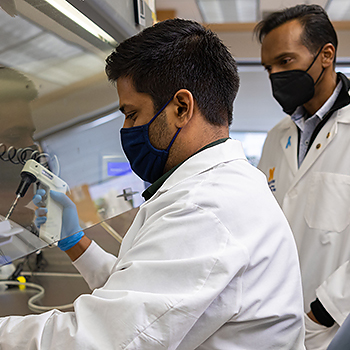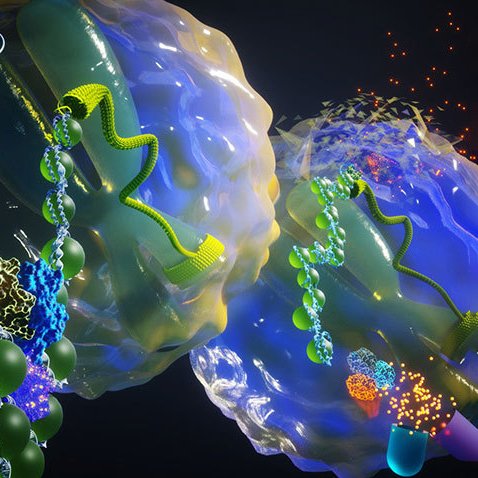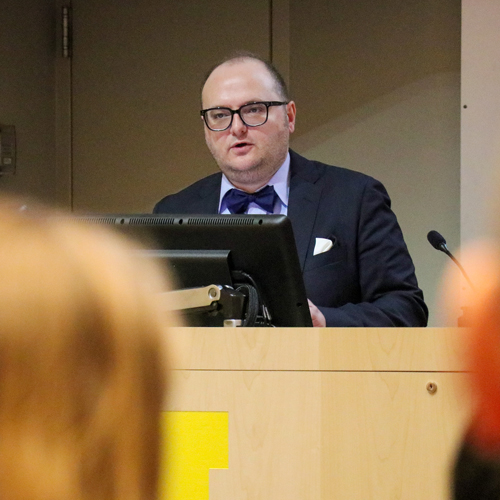News Archive
Filter by Division
Filter by Categories
Lanbo Xiao, PhD: Research Faculty Recognition Award
October 28, 2025 / AwardDr. Lanbo Xiao, a research assistant professor in the Center for Translational Pathology, received a 2025 Faculty Award in recognition of his exceptional contributions to cancer research, teaching, and service. His pioneering work in chromatin remodeling and epigenetic regulation has led to new insights in cancer therapy and significant advances in public health diagnostics.
From Health Lab: Researchers find a targeted approach to shut down prostate cancer growth
October 20, 2025 / CancerFrom Health Lab: Study reveals mechanisms behind common mutation and prostate cancer
July 24, 2025 / CancerStudy reveals mechanisms behind common mutation and prostate cancer. Researchers discovered two distinct ways mutation of the FOXA1 gene alters tumor formation and therapy resistance in prostate cancer in mouse models.
Dr. Abhijit Parolia - A Rising Scholar
March 21, 2025 / Prostate CancerOn Thursday, March 20th, the National Institutes of Health, National Cancer Institute presented its Rising Scholars Lecture with pathology’s Dr. Abhijit Parolia, assistant professor of experimental pathology, entitled NSD2 is a requisite subunit of the AR/FOXA1 neo-enhanceosome in promoting prostate tumorigenesis. Rising Scholar lectures showcase NCI-supported early career researchers with outstanding research findings.
Is it Cancer? Patient-Centered Pathology Reports vs. Standard Pathology Reports in a new study from the Department of Pathology at Michigan
January 6, 2025 / Clinical ResearchImagine you are a patient who just had a biopsy completed. You wait nervously for the results and check your patient portal to see if any results have been received. After an anxious couple of days, you receive the results, only to read them and have no idea what they mean. It is Friday afternoon, your doctor’s office is closed, and you fret all weekend. This scenario plays out frequently and was the impetus for a research study conducted by Dr. Cathryn Lapedis and colleagues.
Researchers identify factor that drives prostate cancer-causing genes
September 10, 2024 / Cancer ResearchResearchers at the University of Michigan Health Rogel Cancer Center have uncovered a key reason why a typically normal protein goes awry and fuels cancer.
They found the protein NSD2 alters the function of the androgen receptor, an important regulator of normal prostate development. When androgen receptor binds with NSD2, it causes rapid cell division and growth leading to prostate cancer. The study, published in Nature Genetics, may suggest a new way to therapeutically target prostate cancer. The findings illuminate a phenomenon not previously understood.
Pathologists Aid in Patient Understanding and Quality of Care
July 30, 2024 / Health LabWith the passage of the 21st Century Cures Act in 2021, patients were granted access to their medical test results without delay—often before their physician can review them. Pathology reports aren’t written with patients as a target audience and they contain complex medical terminology which can often lead to patient confusion and anxiety.  To address this, researchers led by Cathryn Lapedis, M.D., M.P.H., of the Department of Pathology at Michigan Medicine, recently examined how a pathology explanation clinic, or PEC, could improve the experience of a small group of patients newly diagnosed with prostate cancer.
To address this, researchers led by Cathryn Lapedis, M.D., M.P.H., of the Department of Pathology at Michigan Medicine, recently examined how a pathology explanation clinic, or PEC, could improve the experience of a small group of patients newly diagnosed with prostate cancer.
Development and Validation of an 18-Gene Urine Test for High-Grade Prostate Cancer
May 13, 2024 / MctpIn a manuscript published this week in JAMA Oncology, senior author Dr. Arul Chinnaiyan and members of the EDRN-PCA3 Study Group reported on their development and validation of a new 18-gene urine-based test for diagnosis of high-grade prostate cancer, MPS2. This test was initially developed in the Department of Pathology.
A Pathway to Discovery
November 2, 2023 / PstpPhysician Scientist Dr. Aaron Udager shares his journey.
Dr. Arul Chinnaiyan Recognized for Outstanding Achievement in Pathology
June 28, 2023 / AwardDr. Arul Chinnaiyan, S. P. Hicks Endowed Professor of Pathology and Professor of Urology at Michigan Medicine Department of Pathology and Director of the Michigan Center for Translational Pathology, was recently recognized for his outstanding achievements by the American Association of Cancer Research. He was presented with the AACR James S. Ewing-Thelma B. Dunn Award for Outstanding Achievement in Pathology in Cancer Research award at the 2023 AACR Annual Meeting. Please join us in congratulating Dr. Arul Chinnaiyan for this well-deserved prestigious honor!
Rogel Researchers Receive $4M Through Prostate Cancer Foundations Inaugural TACTICAL Awards Program
January 10, 2023 / MctpThe University of Michigan Rogel Cancer Center researchers received one of the Prostate Cancer Foundation’s four inaugural Class of 2022 TACTICAL (Therapy ACceleration To Intercept Cancer Lethality) Award. This $30 million program will support cross-disciplinary pioneering research toward the goal of developing 21st Century therapies for the most life-threatening form of prostate cancer [...]
Cytomorphology and IHC helps diagnose transformed metastatic prostate cancer
October 27, 2022 / MctpA research team from the Michigan Center for Translational Pathology undertook a study to illustrate how careful assessment of cytologic and biomarker features may provide physicians with information on Metastatic Prostatic Cancer (MCP) patients’ prognosis and the best therapies to consider [...]
Using Artificial Intelligence to predict ERG Gene Fusion in Prostate Cancer
May 10, 2022 / Cancer ResearchThe role of artificial intelligence (AI) in healthcare continues to expand. In a recent issue of BMC Cancer, Dr. Vipulkumar Dadhania (first author) and colleagues published a result of their study Leveraging artificial intelligence to predict ERG gene fusion status in prostate cancer. The expert team from the Michigan Center for Translational Pathology developed a deep-learning-based model to predict ERG genomic rearrangements in prostatic adenocarcinomas using only H&E-stained digital slides [...]
Study Demonstrates a Novel Approach to Target Enhancer-Addicted Cancers
January 4, 2022 / MctpA chromatin degrader stops transcription factors from driving cancer, which may serve as a potential treatment approach for over 90% of prostate cancers.
Andi Cani becomes Dr. Cani
December 23, 2019 / Phd ProgramAndi Cani, PhD, successfully defended his thesis entitled “Precision Medicine Approaches to Hormone-Driven Cancer” on December 5, 2019. [...]
September is Prostate Cancer Awareness Month
September 17, 2019 / CancerEvery year in the United States, nearly 3 million men hear the words, “You have prostate cancer.” That is 1 in 9 men each year. The word “cancer” triggers an immediate response in most people…fear, worry about family, denial, and often an increased awareness of one’s mortality. [...]













 ON THE COVER
ON THE COVER
 ON THE COVER
ON THE COVER
 ON THE COVER
ON THE COVER
 ON THE COVER
ON THE COVER
 ON THE COVER
ON THE COVER
 ON THE COVER
ON THE COVER
 ON THE COVER
ON THE COVER
 ON THE COVER
ON THE COVER
 ON THE COVER
ON THE COVER
 ON THE COVER
ON THE COVER
 ON THE COVER
ON THE COVER
